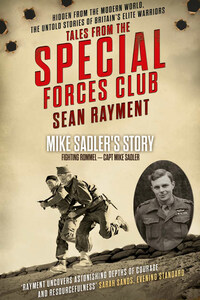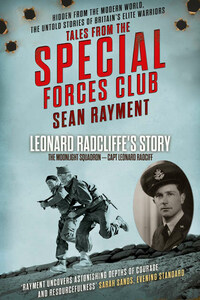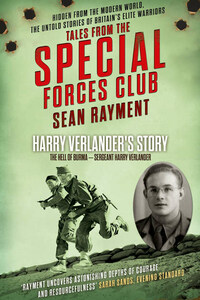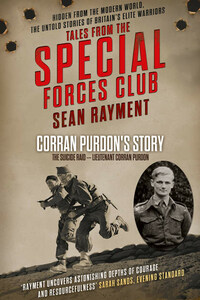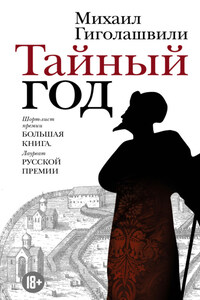âThe boy Stirling is quite mad, quite, quite mad. However, in a war there is often a place for mad people.â
Field-Marshal Montgomery, describing David Stirling, the founder of the SAS
Captain Mike Sadler, MC, MM, has been famous within the world of special forces since 1942. Like Jimmy Patch, another of the veterans I spoke to, he served in the LRDG during the North African campaign. It was Jimmy who put me in touch with him. âMike is a very nice chap and saw a great deal of action in the desert. Try and talk to him, heâll have a great story to tell you.â
When Mike served alongside Lieutenant-Colonel David Stirling, the founder of the SAS, and Lieutenant-Colonel Paddy Mayne, his successor, his navigating skills were legendary. He was regarded as one of the best navigators in the western desert, possessing an unerring ability to navigate by both day and night and in all weathers âa skill which undoubtedly saved dozens of lives and helped to ensure the success of some of the SASâs most spectacular missions during the North African campaign. Typically, he himself says he was just competent and lucky. Mike has been a longtime member of the Special Forces Club. The establishmentâs walls are adorned with some of the operations in which Mike was personally involved. He has led a varied and fascinating life but, like many of those early members of the club, in the 1930s Mike was heading in a completely different direction until war intervened.
Today Mike lives in Cheltenham, Gloucestershire, and we arranged to meet and have lunch and then, hopefully, chat about his wartime activities.
The years have been kind to Mike, who is aged 92 at the time of our meeting. Despite his failing eyesight and âslightly dodgy memoryâ, as he put it, he remains fit and active and insists we walk the mile to the restaurant for lunch.
Mike is easy-going and chats comfortably about his wartime activities. He enquires about Jimmy Patch, praising the courage and fortitude he demonstrated during the war as if it were yesterday. âWe didnât know each other back then, I think we must have served at different times. By the time Jimmy joined I had moved on.â One story rolls out after another. He talks about David Stirling, the founder of the SAS, as if he were still alive, and he was clearly a great fan of Paddy Mayne.
When we return to Mikeâs flat I ask if he minds if I take notes as we talk. He looks slightly uncomfortable, and I notice his brow furrowing before he replies: âI shouldnât really be speaking about any of this.â
My heart begins to sink. âMike, youâre 92 and you fought in a war 70 years ago. Those experiences belong to you and nobody else,â I say in desperation. âYou wonât be breaking the Official Secrets Act by telling me about what you did in North Africa.â
Mike laughs. âI suppose youâre right.â
* * *
Mikeâs war story began over 75 years ago when, after passing his school certificate in 1937, he left Bedales, his public school, and took âmore or less the next boatâ to Rhodesia to become a farmer.
âMy imagination was sparked by a friend at a dreadful prep school I attended called Oakley Hall, near Cirencester. I met this chap called Rooney and he told me all about this wonderful country Rhodesia. His stories were full of lions, elephants and adventure. I suppose it may have been a way of escaping the rigours of school life, but from a very early age I had decided that was going to be the life for me.
Mike Sadler
âMy family had a series of connections with people in Rhodesia and one of those was the owner of a tobacco farm. I headed off and went to work at the farm as a sort of apprentice. Tobacco was the cash crop and there were also hundreds of hectares of maize and cattle. I quickly settled into what was a really lovely life. There was a racehorse on the farm, and in the winter when there were no crops to look after we would train the horse. It was a wonderful country; it was a primitive life and it was very nice.â
His idyllic but austere lifestyle in southern Africa came to an end two years later in September 1939, when Britain declared war against Germany. Mike, like millions of other young men across Britainâs vast empire, volunteered for active service.
âI joined the Rhodesian Artillery. The men within the unit were all very keen but our equipment was very basic. We had 3.7-inch Howitzers, screw guns from Kiplingâs day, all very antiquated but useful and still functional.
âDuring that period I learnt how to fire guns using aiming marks and also learnt the appropriate size of charge. Pretty soon after that we drove up to Kenya, chased the Italians up through Somaliland and into Southern Abyssinia, then moved up to Suez, where we joined up with the 8th Army. The Rhodesian Regiment was affiliated to the 60th Rifles,
